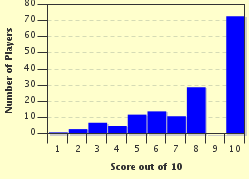Quiz Answer Key and Fun Facts
1. Jerome Jerome, "Three Men in a Boat", "Idle Thoughts of an Idle Fellow"
2. David Lawrence, "Women in Love", "Lady Chatterley's Lover"
3. Joanne Rowling, "Harry Potter and the Prisoner of Azkaban"
4. John Priestley, "An Inspector Calls", "The Good Companions"
5. Philip Dick, "The Man in the High Castle", "Ubik"
6. William Yeats, "The Second Coming", "Easter, 1916"
7. Alfred Housman, "A Shropshire Lad", "De Amicitia"
8. Gilbert Chesterton, "The Napoleon of Notting Hill", "The Adventures of Father Brown"
9. Edward Cummings, "i carry your heart with me (i carry it in my heart)", "Santa Claus: A Morality"
10. Wystan Auden, "September 1, 1939", "Funeral Blues"
Source: Author
Upstart3
This quiz was reviewed by FunTrivia editor
looney_tunes before going online.
Any errors found in FunTrivia content are routinely corrected through our feedback system.


